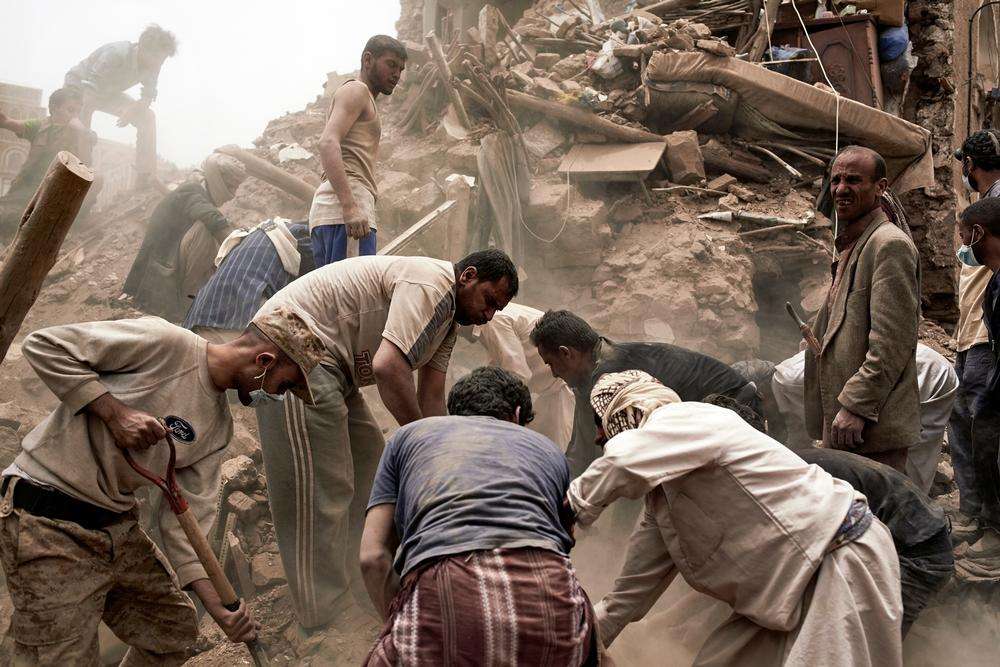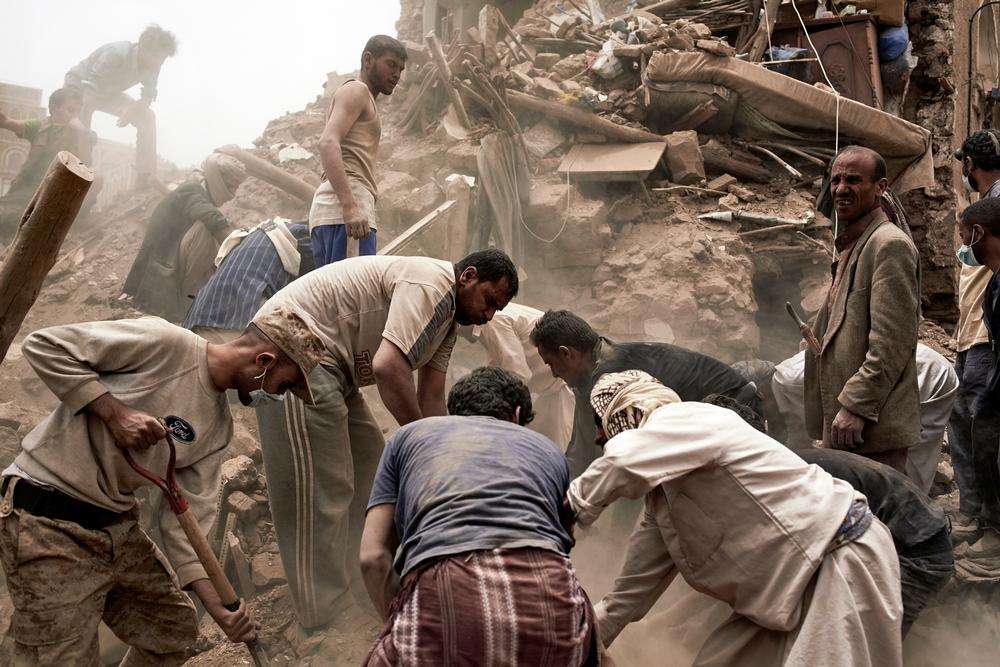This story was originally published in the Middle East Eye.
Celine Langlois served as the emergency medical coordinator for Doctors Without Borders/Médecins Sans Frontières (MSF) for five months in Yemen. She was astonished by people’s ability to get on with daily life amidst airstrikes and a desperate fuel and water crisis.
“In the capital, Sana’a, the warplanes flying over our heads were the main threat. These planes keep people alert, give children sleepless nights, wake babies in the middle of the night, and—most dangerously—kill people. Yemenis have learned to live with them, and so did we. The plane flies over, drops a bomb and goes away—and then comes back. It can stay in the sky for hours, making everyone nervous. All people want is for the plane to empty its deadly cargo and go away so they can continue with their day.
Before an airstrike, there is a whistling noise. The reaction is automatic: find shelter. There were a couple of nights when I rolled under my bed, afraid the windows would be blown in by the blast. The whole house shook. Bombs are being dropped in Yemen on a regular basis and this is how everyone lives.
One day, a compound in front of the main mother and child hospital in Sana’a was heavily bombed by the Saudi-led coalition. While the hospital staff were evacuating patients from the building, two children died—not because of the airstrikes, but because of a lack of oxygen. The main impact of this war is not directly related to the fighting; most deaths are caused by the health care system collapsing. Those two unfortunate children were two amongst many.
In the city of Taiz, where I went next, the main threat was the snipers. Even though you can’t see them, they are always there. When you cross a front line, they are always on your mind. You become hyper-vigilant and super-sensitive to the noise of gunshots—you can tell if it is an AK-47 or a sniper’s gun. You learn quickly in this environment; you have to—it can be a matter of life or death.
However many measures you take, you can still suddenly find yourself in the middle of a fight. One day we were visiting the hospitals that MSF supports across Taiz, which involved crossing front lines. As we entered no man’s land, we saw that two fighters had just been shot in the head by snipers. Before we knew it, we were caught in crossfire.
We got out of the car and tried to find a place to take shelter. Gunshots were coming from everywhere, landing a few meters from us. We crouched behind a water tank. One Yemeni colleague managed to squeeze himself into a tiny gap between the water tank and a brick wall—the adrenaline rush to save your life makes you do things you never imagined doing.
After 20 minutes, a family kindly let us into their house. The father of the house was barefoot, wearing only a Yemeni traditional skirt and a white tank top, and holding a Kalashnikov, ready to protect his home and family. The children looked tired out—they had had no sleep for the past few days, as the fighting had been so intense, with wounded fighters screaming in the streets after being shot. It became more and more obvious that we have to offer psychological support to the Yemeni people as soon as possible.
The gunfight lasted nearly two hours. I’ll never forget the hospitality of that Yemeni family who saved our lives.
Yemenis are incredibly resilient
Traveling around Yemen, you see how they are adapting to living with this indiscriminate war. The fuel and water crisis affects everyone. Every day, you see long queues of cars waiting for gasoline, sometimes for days at a time. You see families walking to wells to get water; people riding motorbikes which have been modified to run on natural gas; men riding horses and donkeys through the middle of Sana’a—proof of how Yemenis have to be creative to be able to get on with daily life.
What astonishes me is that life does go on. The markets are always busy, ice cream sellers ring their bells amongst throngs of heavily armed fighters; windows are repaired; chickens are sold next to checkpoints. Daily business simply goes on. I asked a Yemeni doctor in one of our hospitals if she had had any problems crossing the front line. She said, 'Well yes, but we can’t just stop our life because of the war.'
I got to meet and work with many Yemenis. They are very welcoming and open to others, so you get involved in their personal lives. Everyone I met had lost a loved one—a relative or a friend—in this war. Yemenis’ wounds are wide open and will need a long time to heal. I sincerely hope they will get a chance to heal soon.”
MSF in Taiz
Since May 2015, MSF has been providing emergency medications and surgical supplies to five hospitals, all of which have all been receiving large numbers of people wounded in the escalating violence. Al Rawdah hospital, for example, has received 5,307 war-wounded patients since May 15. MSF is also running an ambulance service for hospital-to-hospital referrals; currently it has two vehicles, to be increased depending on the need.
Despite continued negotiations with officials, MSF is still blocked from delivering stocks of medical supplies to two hospitals in a besieged town in Taiz, in southern Yemen. MSF’s trucks have been stopped several times at Houthi checkpoints and denied access to the area. The hospitals in this besieged area are seeing a large number of patients with war wounds.
In November 2015, MSF opened a 100-bed mother and child hospital, providing obstetric and gynecological care, as well as pediatric care, with a focus on children under five.





